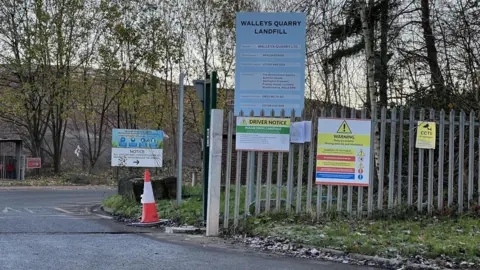10 minutes ago
By Jonathan Sutton, Local Democracy Reporting Service

 LDRS
LDRS
In March, the Environment Agency ordered the site to stop taking new deliveries
Complaints about the stench from a landfill site remain high despite waste deliveries being suspended, new data shows.
More than 1,000 complaints concerning Walleys Quarry were lodged with either the Environment Agency (EA) or Newcastle-under-Lyme Borough Council last month.
People living nearby have lodged high numbers of complaints for a number of years and in March the EA ordered the site to stop taking new deliveries.
A Walleys Quarry spokesperson said the company carried out measures to “ensure that odour risks are managed, minimised and eradicated”.
'Odour events'
The borough council discussed the levels of complaints at a meeting last week.
The data shows that while complaints are still high, they were appearing in spikes, mainly at weekends.
There were also 15 "odour events" in May, when more than 10 complaints are lodged in a single day, as opposed to five such events in April.
Council leader Simon Tagg, said the quarry was not being run "in a good way to stop the odours coming out, and that’s always been the case".
In February, the month prior to the suspension notice, odour complaints made hit 4,210.
'Stringently regulated'
In April, the council asked the government for permission to take legal action against the landfill site's operators.
Councillor Andy Fear, said the process would now be delayed by next month’s general election.
A spokesperson for Walleys Quarry said the landfill site was “stringently regulated by the Environment Agency to ensure the onsite activities do not cause harm to human health or the environment.”
They added that company recognised the impact odours could have on residents, and it “continually inspected the waste deliveries and activities on the landfill to ensure that odour risks are managed, minimised and eradicated.”

 5 months ago
33
5 months ago
33








